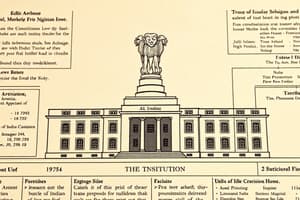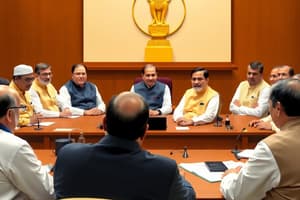Podcast
Questions and Answers
Which list enumerates the matters on which the Parliament has the power to legislate?
Which list enumerates the matters on which the Parliament has the power to legislate?
- Fundamental Rights List
- State List
- Union List (correct)
- Concurrent List
In the event of a conflict between a law made by the Parliament and a law made by a state legislature, which list takes precedence?
In the event of a conflict between a law made by the Parliament and a law made by a state legislature, which list takes precedence?
- Concurrent List
- Union List (correct)
- State List
- Fundamental Rights List
Who can suspend certain Fundamental Rights during a national emergency?
Who can suspend certain Fundamental Rights during a national emergency?
- The Chief Justice of the Supreme Court
- The President (correct)
- The Prime Minister
- The Speaker of the Parliament
What is the role of the Supreme Court in relation to the Fundamental Rights?
What is the role of the Supreme Court in relation to the Fundamental Rights?
What is the nature of the centre-state relationship in the Indian polity?
What is the nature of the centre-state relationship in the Indian polity?
Ecology is the study of the molecular basis of heredity and variation.
Ecology is the study of the molecular basis of heredity and variation.
Population biology is a subdiscipline of genetics.
Population biology is a subdiscipline of genetics.
Biogeography is concerned with the study of predator-prey relationships.
Biogeography is concerned with the study of predator-prey relationships.
Genetics explores the interactions of living organisms with their environment.
Genetics explores the interactions of living organisms with their environment.
Community ecology is a subdiscipline of population biology.
Community ecology is a subdiscipline of population biology.
Ecology is divided into several subdisciplines, including population biology, community ecology, and biogeography.
Ecology is divided into several subdisciplines, including population biology, community ecology, and biogeography.
Genomics is the study of the genetic basis of traits and how they are passed down from one generation to the next.
Genomics is the study of the genetic basis of traits and how they are passed down from one generation to the next.
Evolutionary genetics is the study of how genetic changes occur over time and lead to the evolution of new species.
Evolutionary genetics is the study of how genetic changes occur over time and lead to the evolution of new species.
Ecology is a subdiscipline of biology that explores the molecular basis of heredity and variation.
Ecology is a subdiscipline of biology that explores the molecular basis of heredity and variation.
The genetics of organisms focuses on the study of the entire genetic makeup of an organism.
The genetics of organisms focuses on the study of the entire genetic makeup of an organism.
Genetics is a subdiscipline of biology that explores the interactions of living organisms with their environment.
Genetics is a subdiscipline of biology that explores the interactions of living organisms with their environment.
Biology encompasses numerous subdisciplines, including ecology and genetics.
Biology encompasses numerous subdisciplines, including ecology and genetics.
Flashcards are hidden until you start studying
Study Notes
The Indian polity is structured around a parliamentary system, where the President is the nominal head of state, and the real executive power rests with the Council of Ministers, led by the Prime Minister. The President is elected through an electoral college, which includes members of both the Parliament and State Legislative Assemblies. The Speaker of the Lok Sabha (House of the People) is elected from amongst the members of the House, and the Speaker of the Rajya Sabha (Council of States) is elected by the members of the Rajya Sabha. The Prime Minister is appointed by the President, and the Council of Ministers is collectively responsible to the Lok Sabha.
The Indian Constitution provides for Fundamental Rights, which are essential civil liberties that are protected from state encroachment. These rights include the right to equality, right to freedom, right against exploitation, right to freedom of religion, cultural and educational rights, and right to constitutional remedies. The Constitution also includes Directive Principles of State Policy, which are guidelines for the government to achieve certain social, economic, and political goals.
Centre-State relations in India are based on the division of powers between the central government and the state governments. The Constitution divides all legislative, executive, and financial authority between the centre and the states, creating an integrated system. The Parliament has the power to legislate on matters enumerated in the Union List, while the State List outlines subjects for state jurisdiction. There is also a Concurrent List, where the centre and states have decision-making roles on specific matters.
In the event of a conflict between a law made by the Parliament and a law made by the state legislature, the Constitution grants primacy to the Union List over the State List and Concurrent List. The President can reserve bills passed by state legislatures for his or her consideration, and the central government can instruct states to reserve financial bills for the President's consideration during the budget session of the state legislature.
The Fundamental Rights are protected by the Constitution, and any law that is inconsistent with these rights is void to the extent of such inconsistency. The Constitution also provides for the enforcement of Fundamental Rights through the Supreme Court. During a national emergency, the President can suspend certain Fundamental Rights, but these can be restored upon the termination of the emergency.
In conclusion, the Indian polity is characterized by a parliamentary system, the protection of Fundamental Rights, and a balanced center-state relationship that ensures the efficient functioning of the government. These aspects of the Indian polity are enshrined in the Constitution, which serves as the supreme law of the land and the guiding document for the governance of India.
Studying That Suits You
Use AI to generate personalized quizzes and flashcards to suit your learning preferences.




